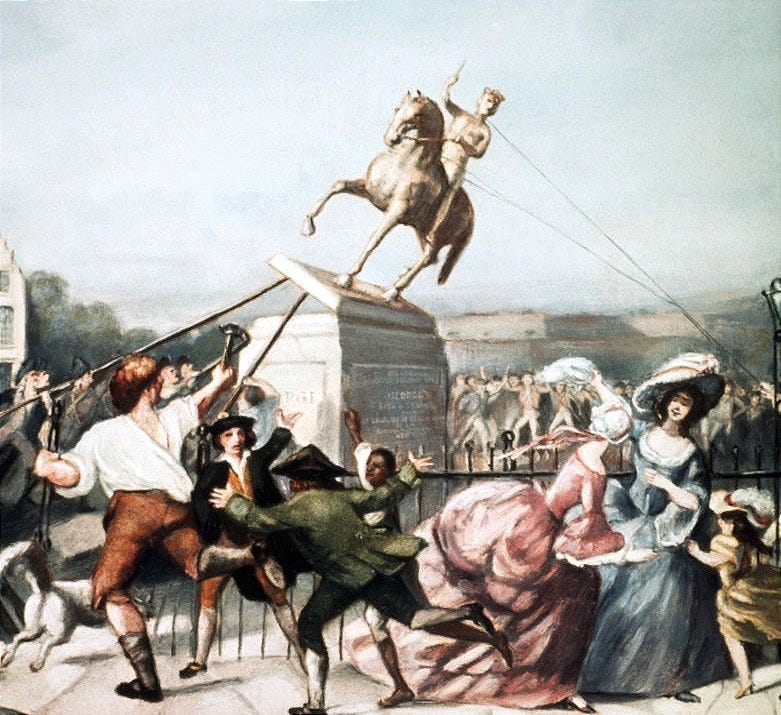What We Should Demand, What We Should Oppose
Description

What should we expect from a president? What should we demand from our government? What should so offend our sensibilities—our sense of right and wrong—that we are willing to disrupt our everyday lives to seek change?
We get great guidance, of course, from our founders’ Declaration of Independence—and not just from the radically aspirational preamble by which our nation can measure itself: “We hold these truths to be self-evident, that all men are created equal, that they are endowed by their Creator with certain unalienable Rights, that among these are Life, Liberty and the pursuit of Happiness.”
We also get direction from the document’s charges against King George III and his “repeated injuries and usurpations,” which have the consequence of creating “an absolute Tyranny over these states.” The list of charges, some of which I have shared before, bear repeating because they so vividly resemble the tyrannical threats that our nation faces from a man who is working aggressively to destroy our system of justice, reject our 249-year-old democratic project and secure himself a gilded throne.
Consider these ten reasons why our forefathers were willing to risk everything to rid themselves of a tyrannical ruler and be free:
He has obstructed the Administration of Justice…
He has made Judges dependent on his Will alone, for the tenure of their offices…
He has erected a multitude of New Offices, and sent hither swarms of Officers to harrass our people, and eat out their substance.
He has kept among us, in times of peace, Standing Armies without the Consent of our legislatures.
For cutting off our Trade with all parts of the world.
For imposing Taxes on us without our Consent.
For depriving us in many cases, of the benefits of Trial by Jury…
For transporting us beyond Seas to be tried for pretended offences.
For taking away our Charters, abolishing our most valuable Laws, and altering fundamentally the Forms of our Governments.
He has excited domestic insurrections amongst us…
Sound familiar? It’s almost as if Donald J. Trump and his band of miscreants read this list to prepare their hostile plot to attack our citizens with “repeated injuries and usurpations.”
It was just 16 years after that declaration ushered in the fight for independence that Alexander Hamilton offered his warning of the ever-present danger that an unprincipled man who yearns to be king could rise to power by exploiting the very democratic processes that he would then seek to destroy. In 1792, Hamilton warned that a popular demagogue could someday achieve his dark purposes by “flattering the prejudices of the people, and exciting their jealousies and apprehensions, to throw affairs into confusion, and bring on civil commotion.”
What kind of man would this be? “A man unprincipled in private life, desperate in his fortune, bold in his temper,” a man who is “known to have scoffed in private at the principles of liberty,” a man who would “take every opportunity of embarrassing the General Government & bringing it under suspicion—to flatter and fall in with all the non-sense of the zealots of the day” and finally “throw things into confusion that he may ‘ride the storm and direct the whirlwind.’”
These ideas and concerns, which Hamilton shared with President George Washington, would re-emerge in Washington’s “Farewell Address” in 1796, a document which he helped write. Both prophetic men understood the importance of warning us—and I mean us today, not just our compatriots from the 18th century—of the dangers that deepening fractures and growing crises could be spurred by broken, unprincipled men should they gain power.
I have been reflecting in recent days about the growing list of transgressions that are wrenching American communities and disturbing so many of us who love our country. Among them:
The increasingly violent rhetoric that demonizes political opponents and is meant to forge a pretext to commit state-sanctioned violence.
The vindictive prosecutions of perceived enemies that make a mockery of the rule of law and our system of justice.
The smug arrogance and hostility by which cabinet secretaries treat responsible elected officials who are trying to understand how this regime is abusing its power.
The determination to deploy our military against our own citizens in Democratic-led cities, falsely justified by conflict and dangers that either don’t exist or are only expanding because of the provocations caused by the presence of armed forces.
The violent abuse of people by masked men employed by the federal government who ignore due process and the rule of law.
The efforts to push a lie that next weekend’s peaceful No Kings protests are actually “hate rallies” involving “terrorists.”
I could go on. I hope you will add to this list of dangerous transgressions bent on sowing chaos, conflict and violence, all for the purposes of consolidating Trump’s power and wealth.
What should we expect from a president? What should we demand from our government to advance the cause of freedom? Surely the strength and the determination to fight injustice.
In 1870, not long after Ulysses S. Grant was elected president, he created the Department of Justice. One of President Grant’s central efforts over the coming year was to pass the Ku Klux Klan Act in order to strengthen the federal government’s ability to fight the Klan’s escalating terror and protect the civil and political rights of some four million previously enslaved men and women endangered by its deadly white supremacist campaign. This was several years after the ratification of the Fourteenth Amendment which defined citizenship and guaranteed due process and equal protection under the law.
The act was tough, giving the president and the Justice Department dramatic new powers to confront the Klan’s vigilante violence. That included authorizing the president to suspend habeas corpus in places where the violence was so extreme that local officials could not enforce the law, permitting the president to deploy the armed forces to suppress domestic violence, banning acts of insurrection and witness intimidation, and enabling federal judges to deny Klan members from serving on juries. This was controversial; Grant’s opponents decried the act as “dictatorial” and hostile to states’ rights.
But it came in the wake of unspeakable horrors intended to frighten Black voters, deny the emergence of Black elected officials, undermine Reconstruction and the new rights of former slaves, and reinstate an oppressive social order in which Black people would forever submit to white masters.
Grant’s Attorney General, Amos Akerman, the first to lead the new Justice Department, said the Klan involved “at least two thirds of the active white men” in certain counties who “no doubt are part of a grand system of criminal associations pervading most of the Southern states.”
In South Carolina, then-governor Robert K. Scott described how “colored men and women have been dragged from their homes at the dead hour of night and most crue





